The Role and Impact of Advance Nurse Practitioners in Healthcare
VerifiedAdded on 2021/01/02
|9
|3382
|272
Report
AI Summary
This report provides an in-depth analysis of the role of Advance Nurse Practitioners (ANPs) within the healthcare system. It begins with an introduction to ANPs, describing their responsibilities, which include comprehensive patient assessment, diagnosis, and treatment, often in roles that extend beyond traditional nursing. The report then delves into the specific roles of ANPs in hospitals and healthcare systems, highlighting their ability to work with a high degree of independence. It further examines the national and international standards of practice that guide ANPs, particularly focusing on the standards set by the Nursing and Midwifery Board of Australia (NMBA), which outline the necessary skills, knowledge, and ethical considerations for safe practice. The report also assesses the significant impact of ANPs on the healthcare system, emphasizing their cost-effectiveness, ability to manage a wide range of patient needs, and contributions to improved healthcare delivery. The report uses The Royal Melbourne Hospital (RMH) as a case study for the assessment. The conclusion summarizes the key findings and reinforces the importance of ANPs in modern healthcare.
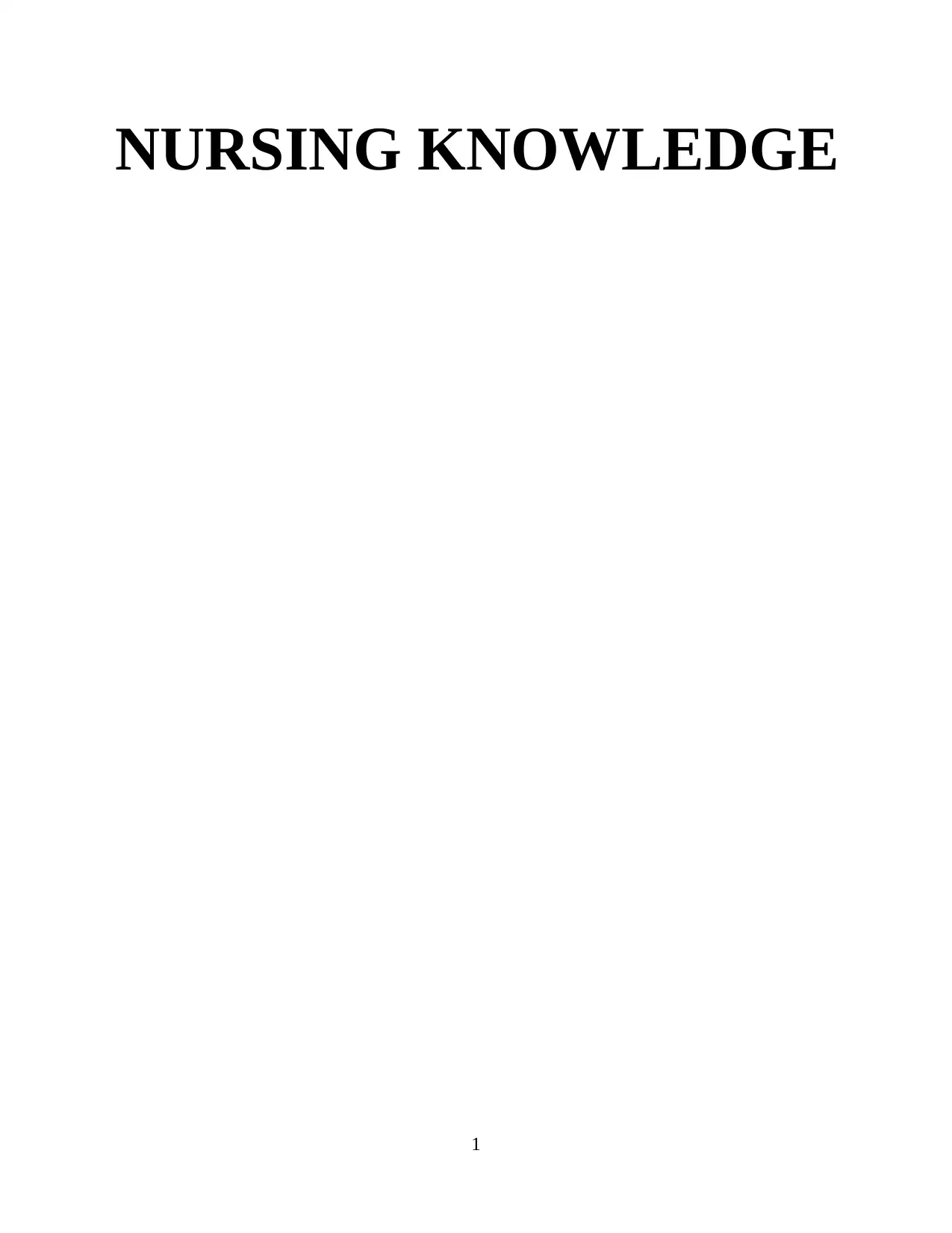
NURSING KNOWLEDGE
1
1
Paraphrase This Document
Need a fresh take? Get an instant paraphrase of this document with our AI Paraphraser
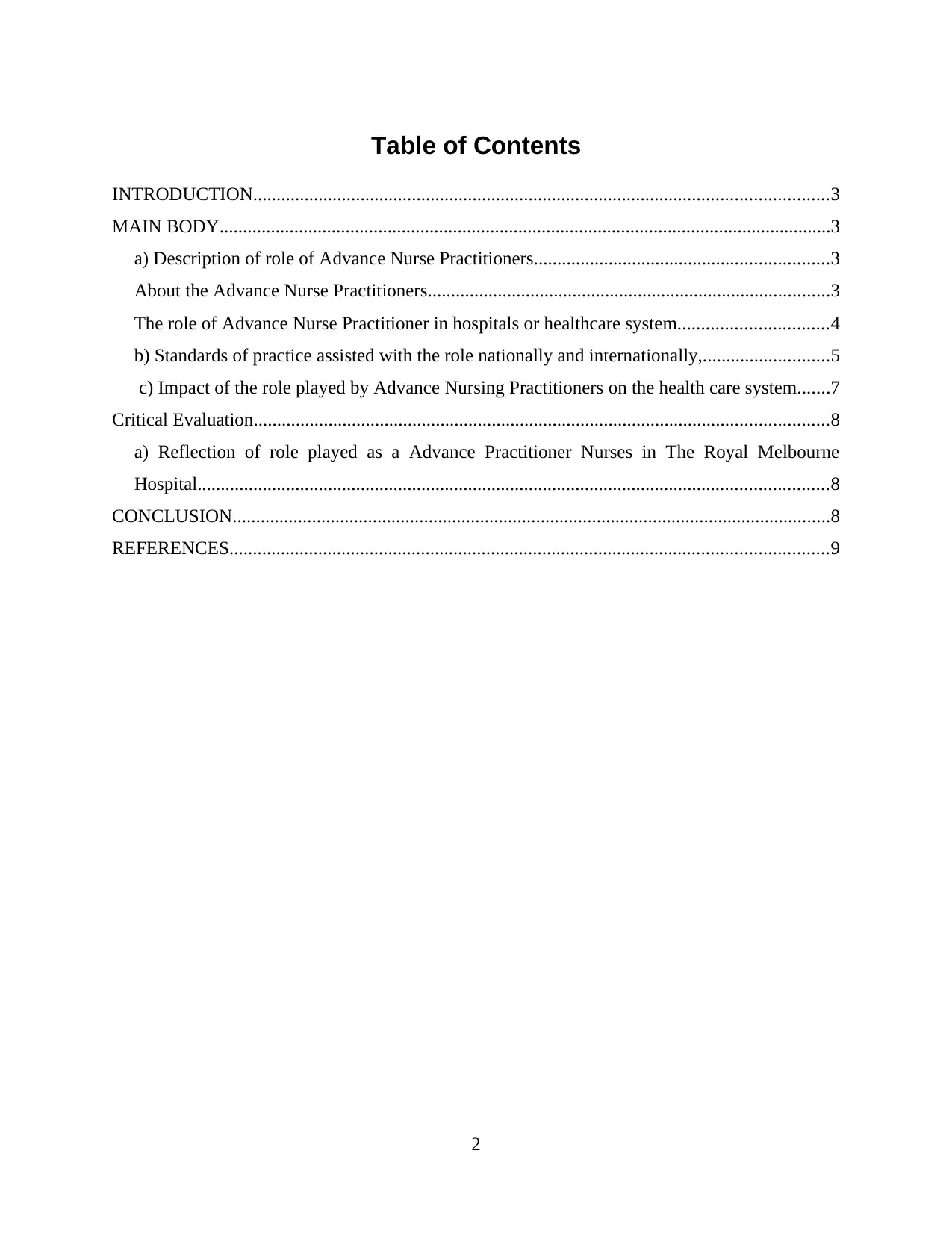
Table of Contents
INTRODUCTION...........................................................................................................................3
MAIN BODY...................................................................................................................................3
a) Description of role of Advance Nurse Practitioners...............................................................3
About the Advance Nurse Practitioners......................................................................................3
The role of Advance Nurse Practitioner in hospitals or healthcare system................................4
b) Standards of practice assisted with the role nationally and internationally,...........................5
c) Impact of the role played by Advance Nursing Practitioners on the health care system.......7
Critical Evaluation...........................................................................................................................8
a) Reflection of role played as a Advance Practitioner Nurses in The Royal Melbourne
Hospital.......................................................................................................................................8
CONCLUSION................................................................................................................................8
REFERENCES................................................................................................................................9
2
INTRODUCTION...........................................................................................................................3
MAIN BODY...................................................................................................................................3
a) Description of role of Advance Nurse Practitioners...............................................................3
About the Advance Nurse Practitioners......................................................................................3
The role of Advance Nurse Practitioner in hospitals or healthcare system................................4
b) Standards of practice assisted with the role nationally and internationally,...........................5
c) Impact of the role played by Advance Nursing Practitioners on the health care system.......7
Critical Evaluation...........................................................................................................................8
a) Reflection of role played as a Advance Practitioner Nurses in The Royal Melbourne
Hospital.......................................................................................................................................8
CONCLUSION................................................................................................................................8
REFERENCES................................................................................................................................9
2
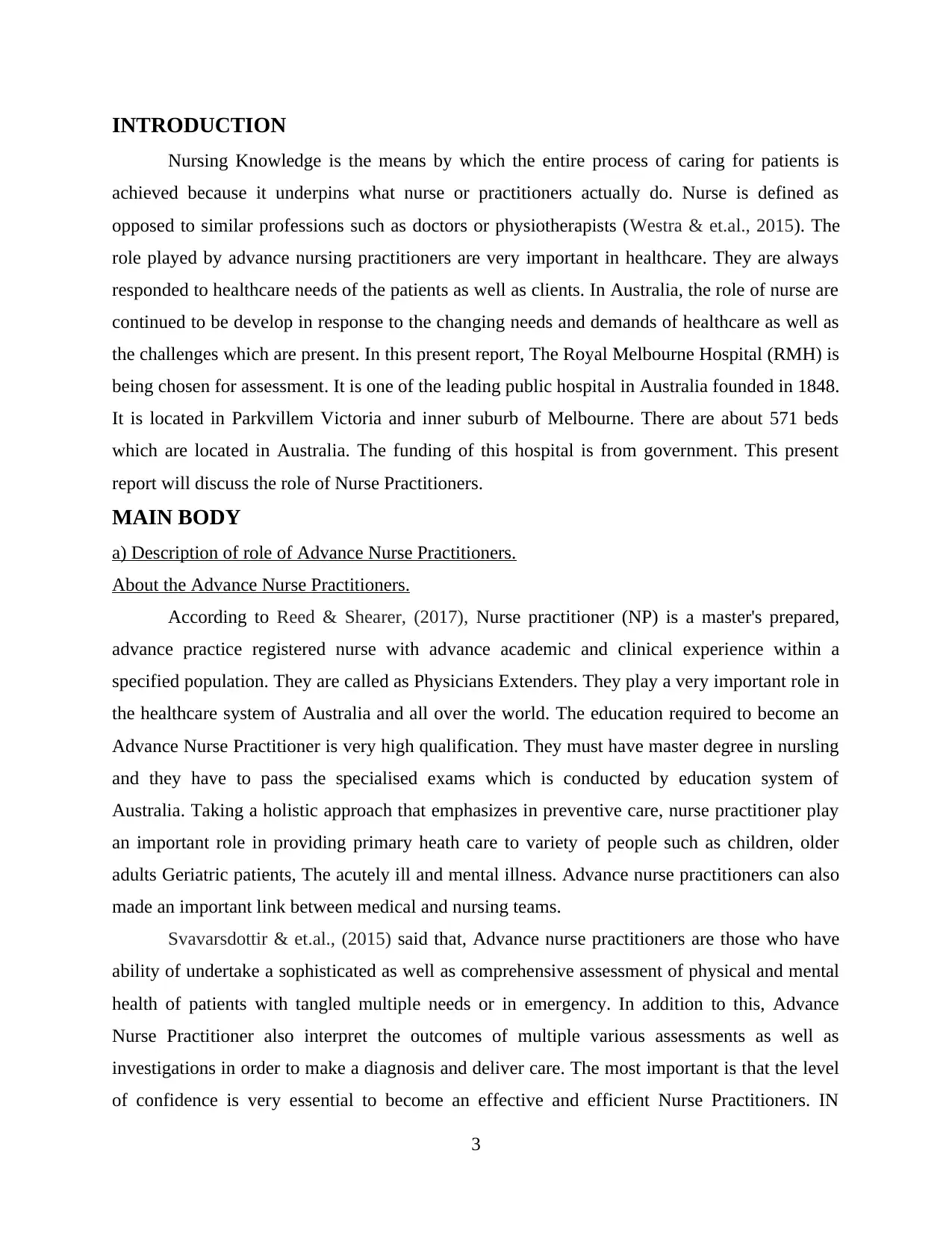
INTRODUCTION
Nursing Knowledge is the means by which the entire process of caring for patients is
achieved because it underpins what nurse or practitioners actually do. Nurse is defined as
opposed to similar professions such as doctors or physiotherapists (Westra & et.al., 2015). The
role played by advance nursing practitioners are very important in healthcare. They are always
responded to healthcare needs of the patients as well as clients. In Australia, the role of nurse are
continued to be develop in response to the changing needs and demands of healthcare as well as
the challenges which are present. In this present report, The Royal Melbourne Hospital (RMH) is
being chosen for assessment. It is one of the leading public hospital in Australia founded in 1848.
It is located in Parkvillem Victoria and inner suburb of Melbourne. There are about 571 beds
which are located in Australia. The funding of this hospital is from government. This present
report will discuss the role of Nurse Practitioners.
MAIN BODY
a) Description of role of Advance Nurse Practitioners.
About the Advance Nurse Practitioners.
According to Reed & Shearer, (2017), Nurse practitioner (NP) is a master's prepared,
advance practice registered nurse with advance academic and clinical experience within a
specified population. They are called as Physicians Extenders. They play a very important role in
the healthcare system of Australia and all over the world. The education required to become an
Advance Nurse Practitioner is very high qualification. They must have master degree in nursling
and they have to pass the specialised exams which is conducted by education system of
Australia. Taking a holistic approach that emphasizes in preventive care, nurse practitioner play
an important role in providing primary heath care to variety of people such as children, older
adults Geriatric patients, The acutely ill and mental illness. Advance nurse practitioners can also
made an important link between medical and nursing teams.
Svavarsdottir & et.al., (2015) said that, Advance nurse practitioners are those who have
ability of undertake a sophisticated as well as comprehensive assessment of physical and mental
health of patients with tangled multiple needs or in emergency. In addition to this, Advance
Nurse Practitioner also interpret the outcomes of multiple various assessments as well as
investigations in order to make a diagnosis and deliver care. The most important is that the level
of confidence is very essential to become an effective and efficient Nurse Practitioners. IN
3
Nursing Knowledge is the means by which the entire process of caring for patients is
achieved because it underpins what nurse or practitioners actually do. Nurse is defined as
opposed to similar professions such as doctors or physiotherapists (Westra & et.al., 2015). The
role played by advance nursing practitioners are very important in healthcare. They are always
responded to healthcare needs of the patients as well as clients. In Australia, the role of nurse are
continued to be develop in response to the changing needs and demands of healthcare as well as
the challenges which are present. In this present report, The Royal Melbourne Hospital (RMH) is
being chosen for assessment. It is one of the leading public hospital in Australia founded in 1848.
It is located in Parkvillem Victoria and inner suburb of Melbourne. There are about 571 beds
which are located in Australia. The funding of this hospital is from government. This present
report will discuss the role of Nurse Practitioners.
MAIN BODY
a) Description of role of Advance Nurse Practitioners.
About the Advance Nurse Practitioners.
According to Reed & Shearer, (2017), Nurse practitioner (NP) is a master's prepared,
advance practice registered nurse with advance academic and clinical experience within a
specified population. They are called as Physicians Extenders. They play a very important role in
the healthcare system of Australia and all over the world. The education required to become an
Advance Nurse Practitioner is very high qualification. They must have master degree in nursling
and they have to pass the specialised exams which is conducted by education system of
Australia. Taking a holistic approach that emphasizes in preventive care, nurse practitioner play
an important role in providing primary heath care to variety of people such as children, older
adults Geriatric patients, The acutely ill and mental illness. Advance nurse practitioners can also
made an important link between medical and nursing teams.
Svavarsdottir & et.al., (2015) said that, Advance nurse practitioners are those who have
ability of undertake a sophisticated as well as comprehensive assessment of physical and mental
health of patients with tangled multiple needs or in emergency. In addition to this, Advance
Nurse Practitioner also interpret the outcomes of multiple various assessments as well as
investigations in order to make a diagnosis and deliver care. The most important is that the level
of confidence is very essential to become an effective and efficient Nurse Practitioners. IN
3
⊘ This is a preview!⊘
Do you want full access?
Subscribe today to unlock all pages.

Trusted by 1+ million students worldwide
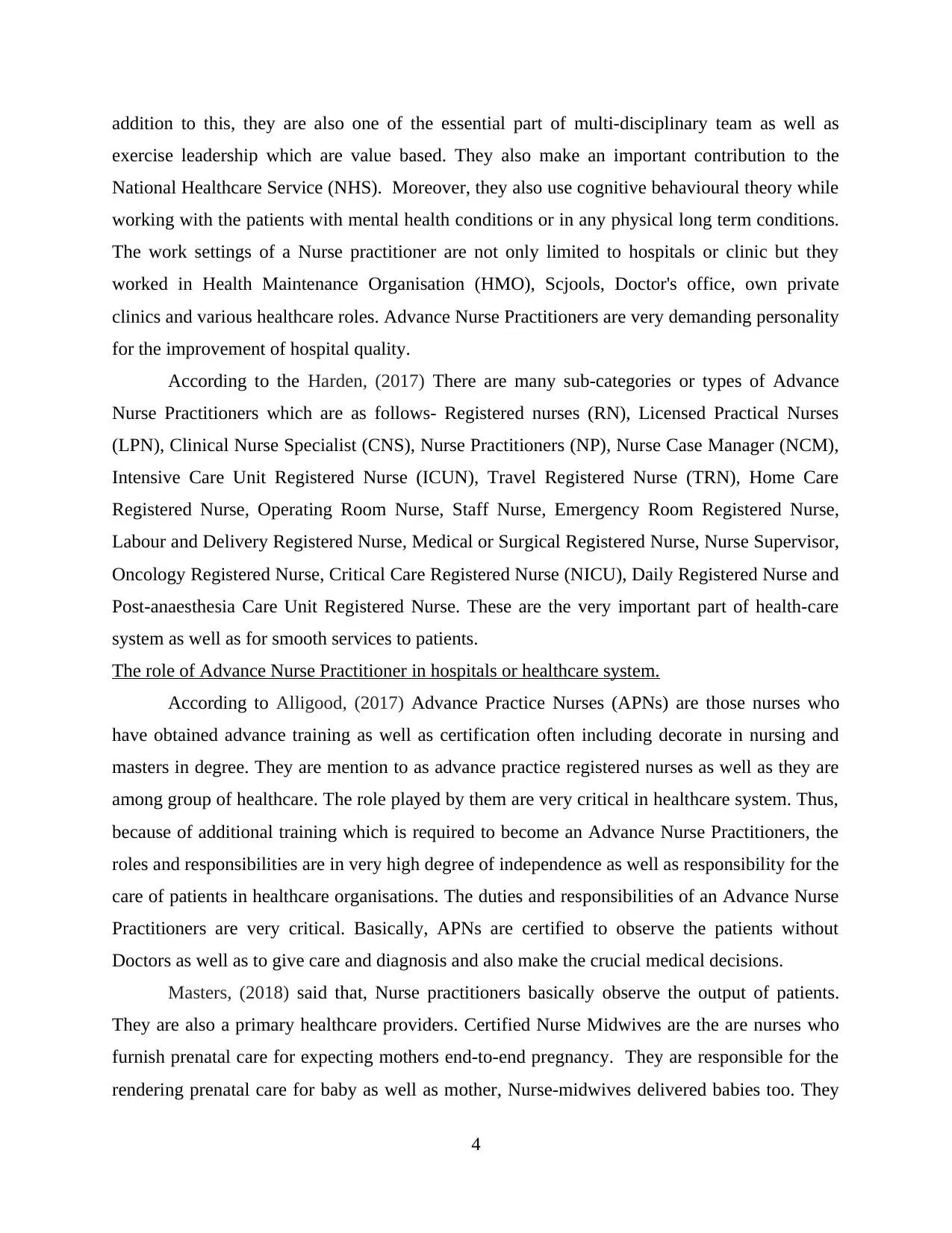
addition to this, they are also one of the essential part of multi-disciplinary team as well as
exercise leadership which are value based. They also make an important contribution to the
National Healthcare Service (NHS). Moreover, they also use cognitive behavioural theory while
working with the patients with mental health conditions or in any physical long term conditions.
The work settings of a Nurse practitioner are not only limited to hospitals or clinic but they
worked in Health Maintenance Organisation (HMO), Scjools, Doctor's office, own private
clinics and various healthcare roles. Advance Nurse Practitioners are very demanding personality
for the improvement of hospital quality.
According to the Harden, (2017) There are many sub-categories or types of Advance
Nurse Practitioners which are as follows- Registered nurses (RN), Licensed Practical Nurses
(LPN), Clinical Nurse Specialist (CNS), Nurse Practitioners (NP), Nurse Case Manager (NCM),
Intensive Care Unit Registered Nurse (ICUN), Travel Registered Nurse (TRN), Home Care
Registered Nurse, Operating Room Nurse, Staff Nurse, Emergency Room Registered Nurse,
Labour and Delivery Registered Nurse, Medical or Surgical Registered Nurse, Nurse Supervisor,
Oncology Registered Nurse, Critical Care Registered Nurse (NICU), Daily Registered Nurse and
Post-anaesthesia Care Unit Registered Nurse. These are the very important part of health-care
system as well as for smooth services to patients.
The role of Advance Nurse Practitioner in hospitals or healthcare system.
According to Alligood, (2017) Advance Practice Nurses (APNs) are those nurses who
have obtained advance training as well as certification often including decorate in nursing and
masters in degree. They are mention to as advance practice registered nurses as well as they are
among group of healthcare. The role played by them are very critical in healthcare system. Thus,
because of additional training which is required to become an Advance Nurse Practitioners, the
roles and responsibilities are in very high degree of independence as well as responsibility for the
care of patients in healthcare organisations. The duties and responsibilities of an Advance Nurse
Practitioners are very critical. Basically, APNs are certified to observe the patients without
Doctors as well as to give care and diagnosis and also make the crucial medical decisions.
Masters, (2018) said that, Nurse practitioners basically observe the output of patients.
They are also a primary healthcare providers. Certified Nurse Midwives are the are nurses who
furnish prenatal care for expecting mothers end-to-end pregnancy. They are responsible for the
rendering prenatal care for baby as well as mother, Nurse-midwives delivered babies too. They
4
exercise leadership which are value based. They also make an important contribution to the
National Healthcare Service (NHS). Moreover, they also use cognitive behavioural theory while
working with the patients with mental health conditions or in any physical long term conditions.
The work settings of a Nurse practitioner are not only limited to hospitals or clinic but they
worked in Health Maintenance Organisation (HMO), Scjools, Doctor's office, own private
clinics and various healthcare roles. Advance Nurse Practitioners are very demanding personality
for the improvement of hospital quality.
According to the Harden, (2017) There are many sub-categories or types of Advance
Nurse Practitioners which are as follows- Registered nurses (RN), Licensed Practical Nurses
(LPN), Clinical Nurse Specialist (CNS), Nurse Practitioners (NP), Nurse Case Manager (NCM),
Intensive Care Unit Registered Nurse (ICUN), Travel Registered Nurse (TRN), Home Care
Registered Nurse, Operating Room Nurse, Staff Nurse, Emergency Room Registered Nurse,
Labour and Delivery Registered Nurse, Medical or Surgical Registered Nurse, Nurse Supervisor,
Oncology Registered Nurse, Critical Care Registered Nurse (NICU), Daily Registered Nurse and
Post-anaesthesia Care Unit Registered Nurse. These are the very important part of health-care
system as well as for smooth services to patients.
The role of Advance Nurse Practitioner in hospitals or healthcare system.
According to Alligood, (2017) Advance Practice Nurses (APNs) are those nurses who
have obtained advance training as well as certification often including decorate in nursing and
masters in degree. They are mention to as advance practice registered nurses as well as they are
among group of healthcare. The role played by them are very critical in healthcare system. Thus,
because of additional training which is required to become an Advance Nurse Practitioners, the
roles and responsibilities are in very high degree of independence as well as responsibility for the
care of patients in healthcare organisations. The duties and responsibilities of an Advance Nurse
Practitioners are very critical. Basically, APNs are certified to observe the patients without
Doctors as well as to give care and diagnosis and also make the crucial medical decisions.
Masters, (2018) said that, Nurse practitioners basically observe the output of patients.
They are also a primary healthcare providers. Certified Nurse Midwives are the are nurses who
furnish prenatal care for expecting mothers end-to-end pregnancy. They are responsible for the
rendering prenatal care for baby as well as mother, Nurse-midwives delivered babies too. They
4
Paraphrase This Document
Need a fresh take? Get an instant paraphrase of this document with our AI Paraphraser
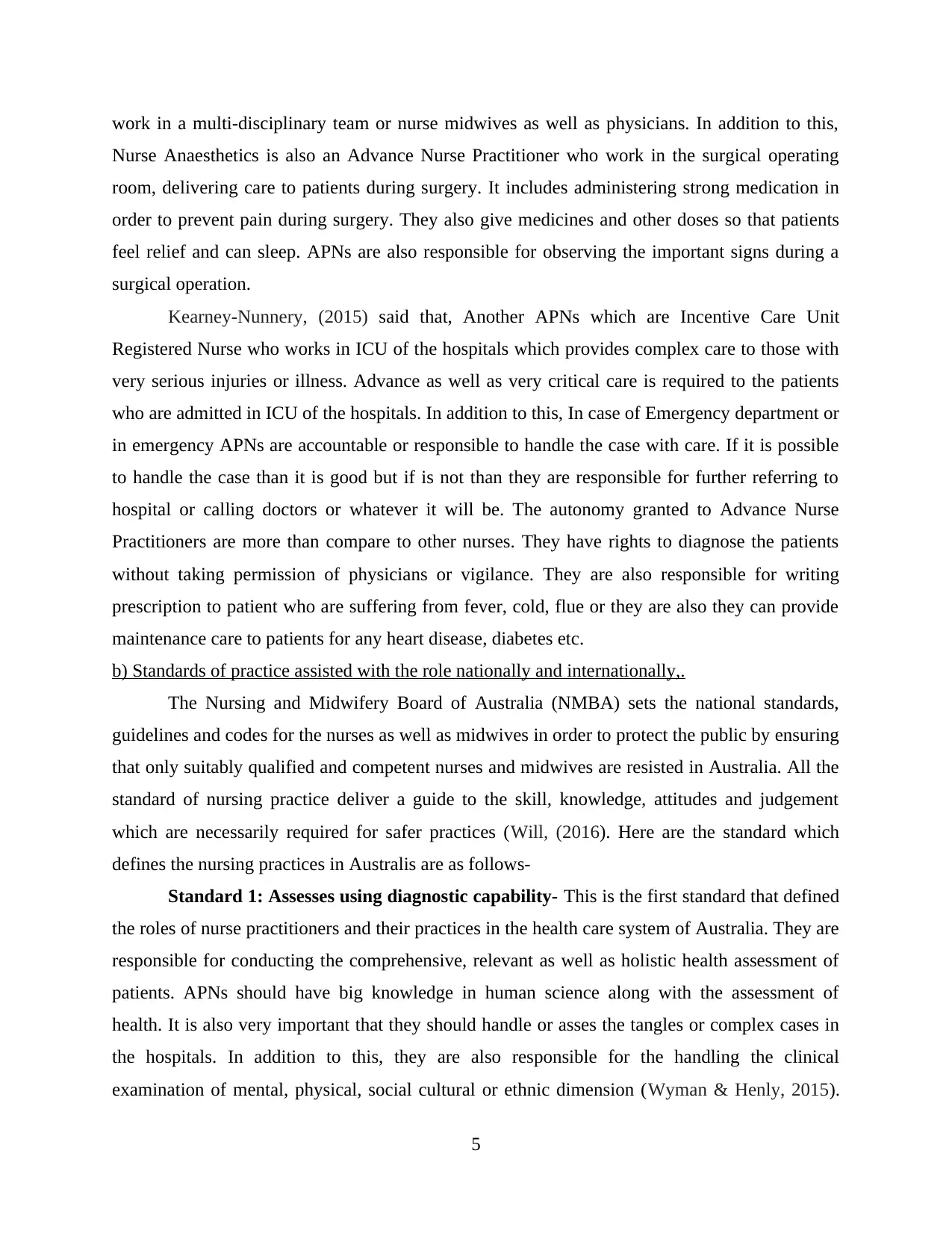
work in a multi-disciplinary team or nurse midwives as well as physicians. In addition to this,
Nurse Anaesthetics is also an Advance Nurse Practitioner who work in the surgical operating
room, delivering care to patients during surgery. It includes administering strong medication in
order to prevent pain during surgery. They also give medicines and other doses so that patients
feel relief and can sleep. APNs are also responsible for observing the important signs during a
surgical operation.
Kearney-Nunnery, (2015) said that, Another APNs which are Incentive Care Unit
Registered Nurse who works in ICU of the hospitals which provides complex care to those with
very serious injuries or illness. Advance as well as very critical care is required to the patients
who are admitted in ICU of the hospitals. In addition to this, In case of Emergency department or
in emergency APNs are accountable or responsible to handle the case with care. If it is possible
to handle the case than it is good but if is not than they are responsible for further referring to
hospital or calling doctors or whatever it will be. The autonomy granted to Advance Nurse
Practitioners are more than compare to other nurses. They have rights to diagnose the patients
without taking permission of physicians or vigilance. They are also responsible for writing
prescription to patient who are suffering from fever, cold, flue or they are also they can provide
maintenance care to patients for any heart disease, diabetes etc.
b) Standards of practice assisted with the role nationally and internationally,.
The Nursing and Midwifery Board of Australia (NMBA) sets the national standards,
guidelines and codes for the nurses as well as midwives in order to protect the public by ensuring
that only suitably qualified and competent nurses and midwives are resisted in Australia. All the
standard of nursing practice deliver a guide to the skill, knowledge, attitudes and judgement
which are necessarily required for safer practices (Will, (2016). Here are the standard which
defines the nursing practices in Australis are as follows-
Standard 1: Assesses using diagnostic capability- This is the first standard that defined
the roles of nurse practitioners and their practices in the health care system of Australia. They are
responsible for conducting the comprehensive, relevant as well as holistic health assessment of
patients. APNs should have big knowledge in human science along with the assessment of
health. It is also very important that they should handle or asses the tangles or complex cases in
the hospitals. In addition to this, they are also responsible for the handling the clinical
examination of mental, physical, social cultural or ethnic dimension (Wyman & Henly, 2015).
5
Nurse Anaesthetics is also an Advance Nurse Practitioner who work in the surgical operating
room, delivering care to patients during surgery. It includes administering strong medication in
order to prevent pain during surgery. They also give medicines and other doses so that patients
feel relief and can sleep. APNs are also responsible for observing the important signs during a
surgical operation.
Kearney-Nunnery, (2015) said that, Another APNs which are Incentive Care Unit
Registered Nurse who works in ICU of the hospitals which provides complex care to those with
very serious injuries or illness. Advance as well as very critical care is required to the patients
who are admitted in ICU of the hospitals. In addition to this, In case of Emergency department or
in emergency APNs are accountable or responsible to handle the case with care. If it is possible
to handle the case than it is good but if is not than they are responsible for further referring to
hospital or calling doctors or whatever it will be. The autonomy granted to Advance Nurse
Practitioners are more than compare to other nurses. They have rights to diagnose the patients
without taking permission of physicians or vigilance. They are also responsible for writing
prescription to patient who are suffering from fever, cold, flue or they are also they can provide
maintenance care to patients for any heart disease, diabetes etc.
b) Standards of practice assisted with the role nationally and internationally,.
The Nursing and Midwifery Board of Australia (NMBA) sets the national standards,
guidelines and codes for the nurses as well as midwives in order to protect the public by ensuring
that only suitably qualified and competent nurses and midwives are resisted in Australia. All the
standard of nursing practice deliver a guide to the skill, knowledge, attitudes and judgement
which are necessarily required for safer practices (Will, (2016). Here are the standard which
defines the nursing practices in Australis are as follows-
Standard 1: Assesses using diagnostic capability- This is the first standard that defined
the roles of nurse practitioners and their practices in the health care system of Australia. They are
responsible for conducting the comprehensive, relevant as well as holistic health assessment of
patients. APNs should have big knowledge in human science along with the assessment of
health. It is also very important that they should handle or asses the tangles or complex cases in
the hospitals. In addition to this, they are also responsible for the handling the clinical
examination of mental, physical, social cultural or ethnic dimension (Wyman & Henly, 2015).
5
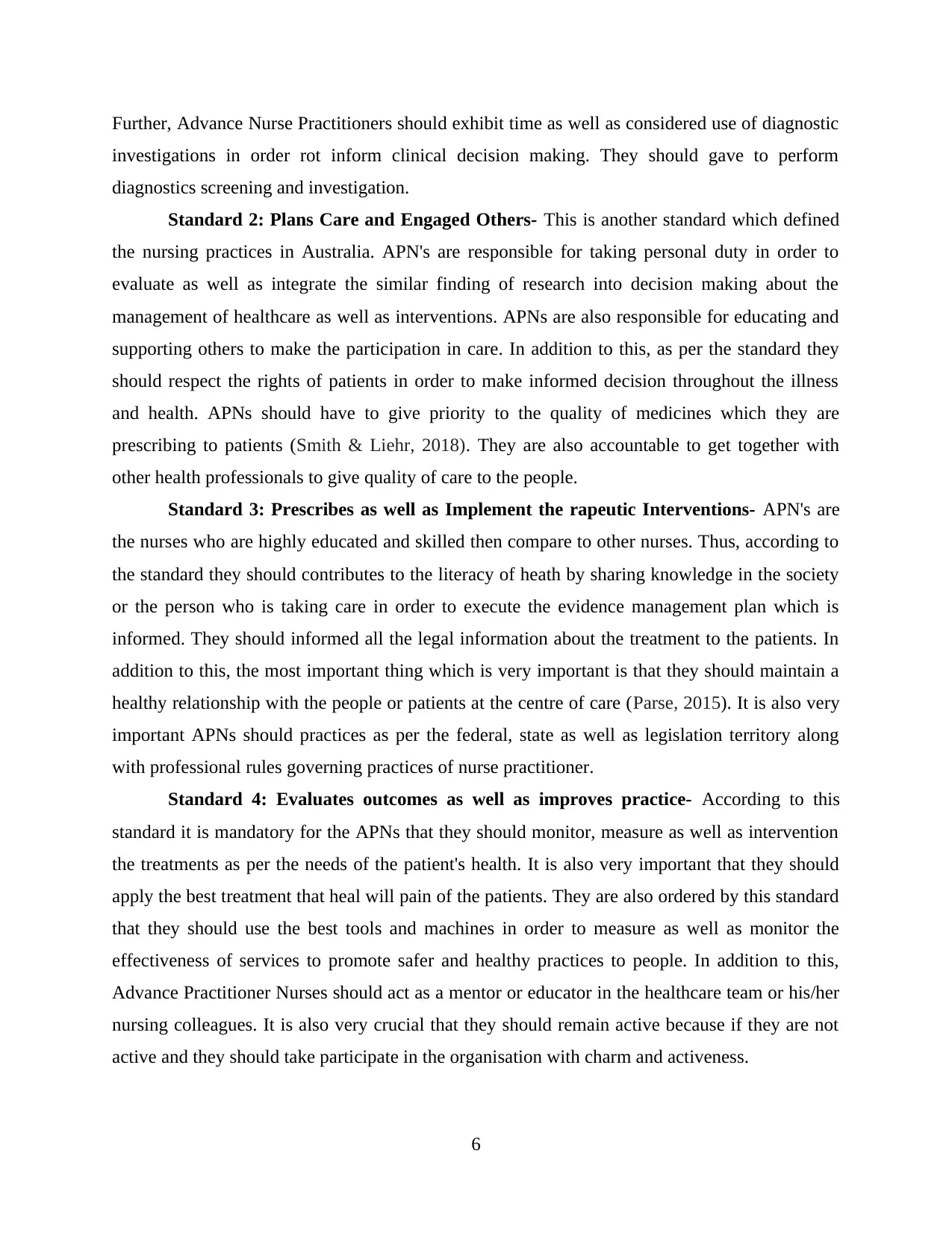
Further, Advance Nurse Practitioners should exhibit time as well as considered use of diagnostic
investigations in order rot inform clinical decision making. They should gave to perform
diagnostics screening and investigation.
Standard 2: Plans Care and Engaged Others- This is another standard which defined
the nursing practices in Australia. APN's are responsible for taking personal duty in order to
evaluate as well as integrate the similar finding of research into decision making about the
management of healthcare as well as interventions. APNs are also responsible for educating and
supporting others to make the participation in care. In addition to this, as per the standard they
should respect the rights of patients in order to make informed decision throughout the illness
and health. APNs should have to give priority to the quality of medicines which they are
prescribing to patients (Smith & Liehr, 2018). They are also accountable to get together with
other health professionals to give quality of care to the people.
Standard 3: Prescribes as well as Implement the rapeutic Interventions- APN's are
the nurses who are highly educated and skilled then compare to other nurses. Thus, according to
the standard they should contributes to the literacy of heath by sharing knowledge in the society
or the person who is taking care in order to execute the evidence management plan which is
informed. They should informed all the legal information about the treatment to the patients. In
addition to this, the most important thing which is very important is that they should maintain a
healthy relationship with the people or patients at the centre of care (Parse, 2015). It is also very
important APNs should practices as per the federal, state as well as legislation territory along
with professional rules governing practices of nurse practitioner.
Standard 4: Evaluates outcomes as well as improves practice- According to this
standard it is mandatory for the APNs that they should monitor, measure as well as intervention
the treatments as per the needs of the patient's health. It is also very important that they should
apply the best treatment that heal will pain of the patients. They are also ordered by this standard
that they should use the best tools and machines in order to measure as well as monitor the
effectiveness of services to promote safer and healthy practices to people. In addition to this,
Advance Practitioner Nurses should act as a mentor or educator in the healthcare team or his/her
nursing colleagues. It is also very crucial that they should remain active because if they are not
active and they should take participate in the organisation with charm and activeness.
6
investigations in order rot inform clinical decision making. They should gave to perform
diagnostics screening and investigation.
Standard 2: Plans Care and Engaged Others- This is another standard which defined
the nursing practices in Australia. APN's are responsible for taking personal duty in order to
evaluate as well as integrate the similar finding of research into decision making about the
management of healthcare as well as interventions. APNs are also responsible for educating and
supporting others to make the participation in care. In addition to this, as per the standard they
should respect the rights of patients in order to make informed decision throughout the illness
and health. APNs should have to give priority to the quality of medicines which they are
prescribing to patients (Smith & Liehr, 2018). They are also accountable to get together with
other health professionals to give quality of care to the people.
Standard 3: Prescribes as well as Implement the rapeutic Interventions- APN's are
the nurses who are highly educated and skilled then compare to other nurses. Thus, according to
the standard they should contributes to the literacy of heath by sharing knowledge in the society
or the person who is taking care in order to execute the evidence management plan which is
informed. They should informed all the legal information about the treatment to the patients. In
addition to this, the most important thing which is very important is that they should maintain a
healthy relationship with the people or patients at the centre of care (Parse, 2015). It is also very
important APNs should practices as per the federal, state as well as legislation territory along
with professional rules governing practices of nurse practitioner.
Standard 4: Evaluates outcomes as well as improves practice- According to this
standard it is mandatory for the APNs that they should monitor, measure as well as intervention
the treatments as per the needs of the patient's health. It is also very important that they should
apply the best treatment that heal will pain of the patients. They are also ordered by this standard
that they should use the best tools and machines in order to measure as well as monitor the
effectiveness of services to promote safer and healthy practices to people. In addition to this,
Advance Practitioner Nurses should act as a mentor or educator in the healthcare team or his/her
nursing colleagues. It is also very crucial that they should remain active because if they are not
active and they should take participate in the organisation with charm and activeness.
6
⊘ This is a preview!⊘
Do you want full access?
Subscribe today to unlock all pages.

Trusted by 1+ million students worldwide
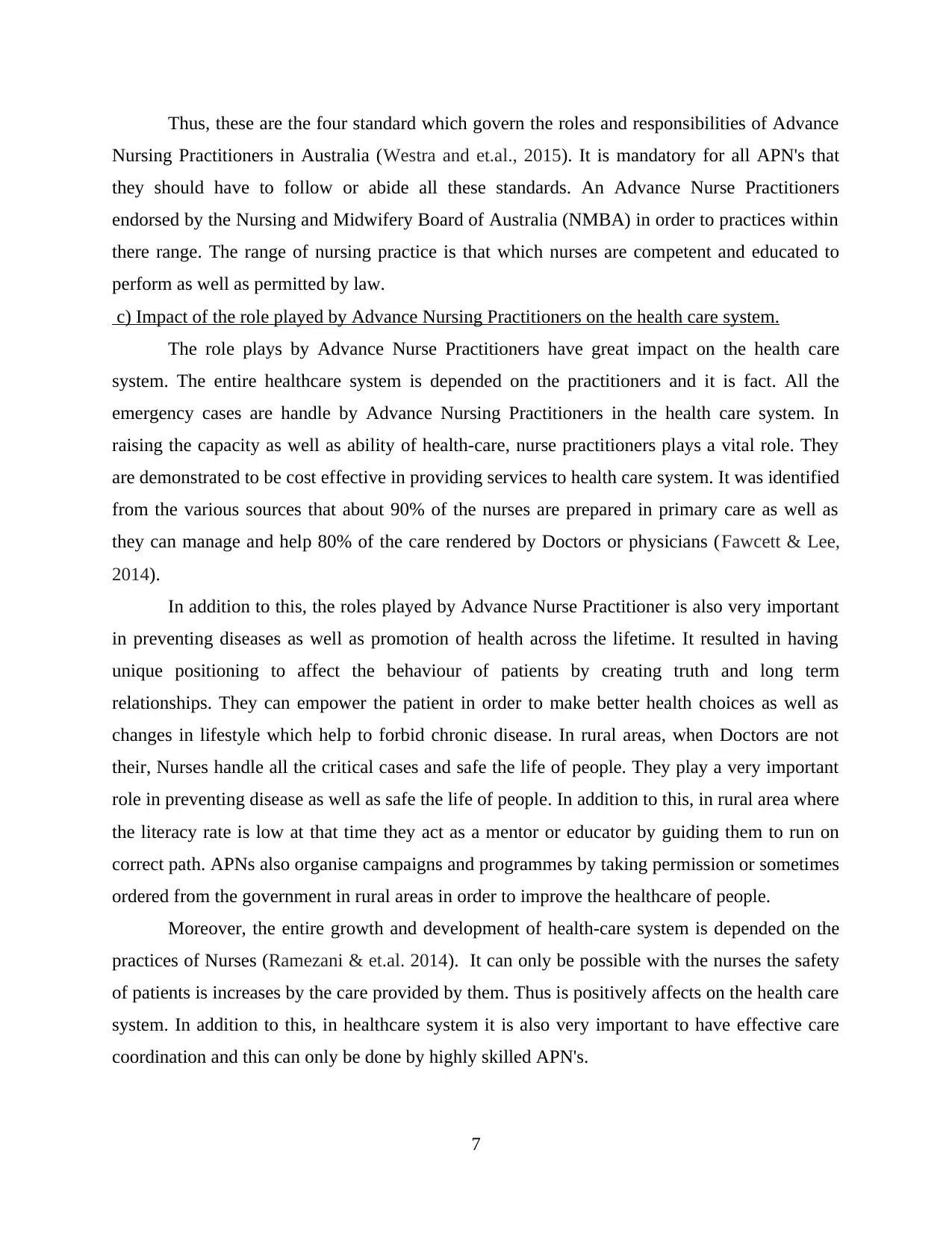
Thus, these are the four standard which govern the roles and responsibilities of Advance
Nursing Practitioners in Australia (Westra and et.al., 2015). It is mandatory for all APN's that
they should have to follow or abide all these standards. An Advance Nurse Practitioners
endorsed by the Nursing and Midwifery Board of Australia (NMBA) in order to practices within
there range. The range of nursing practice is that which nurses are competent and educated to
perform as well as permitted by law.
c) Impact of the role played by Advance Nursing Practitioners on the health care system.
The role plays by Advance Nurse Practitioners have great impact on the health care
system. The entire healthcare system is depended on the practitioners and it is fact. All the
emergency cases are handle by Advance Nursing Practitioners in the health care system. In
raising the capacity as well as ability of health-care, nurse practitioners plays a vital role. They
are demonstrated to be cost effective in providing services to health care system. It was identified
from the various sources that about 90% of the nurses are prepared in primary care as well as
they can manage and help 80% of the care rendered by Doctors or physicians (Fawcett & Lee,
2014).
In addition to this, the roles played by Advance Nurse Practitioner is also very important
in preventing diseases as well as promotion of health across the lifetime. It resulted in having
unique positioning to affect the behaviour of patients by creating truth and long term
relationships. They can empower the patient in order to make better health choices as well as
changes in lifestyle which help to forbid chronic disease. In rural areas, when Doctors are not
their, Nurses handle all the critical cases and safe the life of people. They play a very important
role in preventing disease as well as safe the life of people. In addition to this, in rural area where
the literacy rate is low at that time they act as a mentor or educator by guiding them to run on
correct path. APNs also organise campaigns and programmes by taking permission or sometimes
ordered from the government in rural areas in order to improve the healthcare of people.
Moreover, the entire growth and development of health-care system is depended on the
practices of Nurses (Ramezani & et.al. 2014). It can only be possible with the nurses the safety
of patients is increases by the care provided by them. Thus is positively affects on the health care
system. In addition to this, in healthcare system it is also very important to have effective care
coordination and this can only be done by highly skilled APN's.
7
Nursing Practitioners in Australia (Westra and et.al., 2015). It is mandatory for all APN's that
they should have to follow or abide all these standards. An Advance Nurse Practitioners
endorsed by the Nursing and Midwifery Board of Australia (NMBA) in order to practices within
there range. The range of nursing practice is that which nurses are competent and educated to
perform as well as permitted by law.
c) Impact of the role played by Advance Nursing Practitioners on the health care system.
The role plays by Advance Nurse Practitioners have great impact on the health care
system. The entire healthcare system is depended on the practitioners and it is fact. All the
emergency cases are handle by Advance Nursing Practitioners in the health care system. In
raising the capacity as well as ability of health-care, nurse practitioners plays a vital role. They
are demonstrated to be cost effective in providing services to health care system. It was identified
from the various sources that about 90% of the nurses are prepared in primary care as well as
they can manage and help 80% of the care rendered by Doctors or physicians (Fawcett & Lee,
2014).
In addition to this, the roles played by Advance Nurse Practitioner is also very important
in preventing diseases as well as promotion of health across the lifetime. It resulted in having
unique positioning to affect the behaviour of patients by creating truth and long term
relationships. They can empower the patient in order to make better health choices as well as
changes in lifestyle which help to forbid chronic disease. In rural areas, when Doctors are not
their, Nurses handle all the critical cases and safe the life of people. They play a very important
role in preventing disease as well as safe the life of people. In addition to this, in rural area where
the literacy rate is low at that time they act as a mentor or educator by guiding them to run on
correct path. APNs also organise campaigns and programmes by taking permission or sometimes
ordered from the government in rural areas in order to improve the healthcare of people.
Moreover, the entire growth and development of health-care system is depended on the
practices of Nurses (Ramezani & et.al. 2014). It can only be possible with the nurses the safety
of patients is increases by the care provided by them. Thus is positively affects on the health care
system. In addition to this, in healthcare system it is also very important to have effective care
coordination and this can only be done by highly skilled APN's.
7
Paraphrase This Document
Need a fresh take? Get an instant paraphrase of this document with our AI Paraphraser
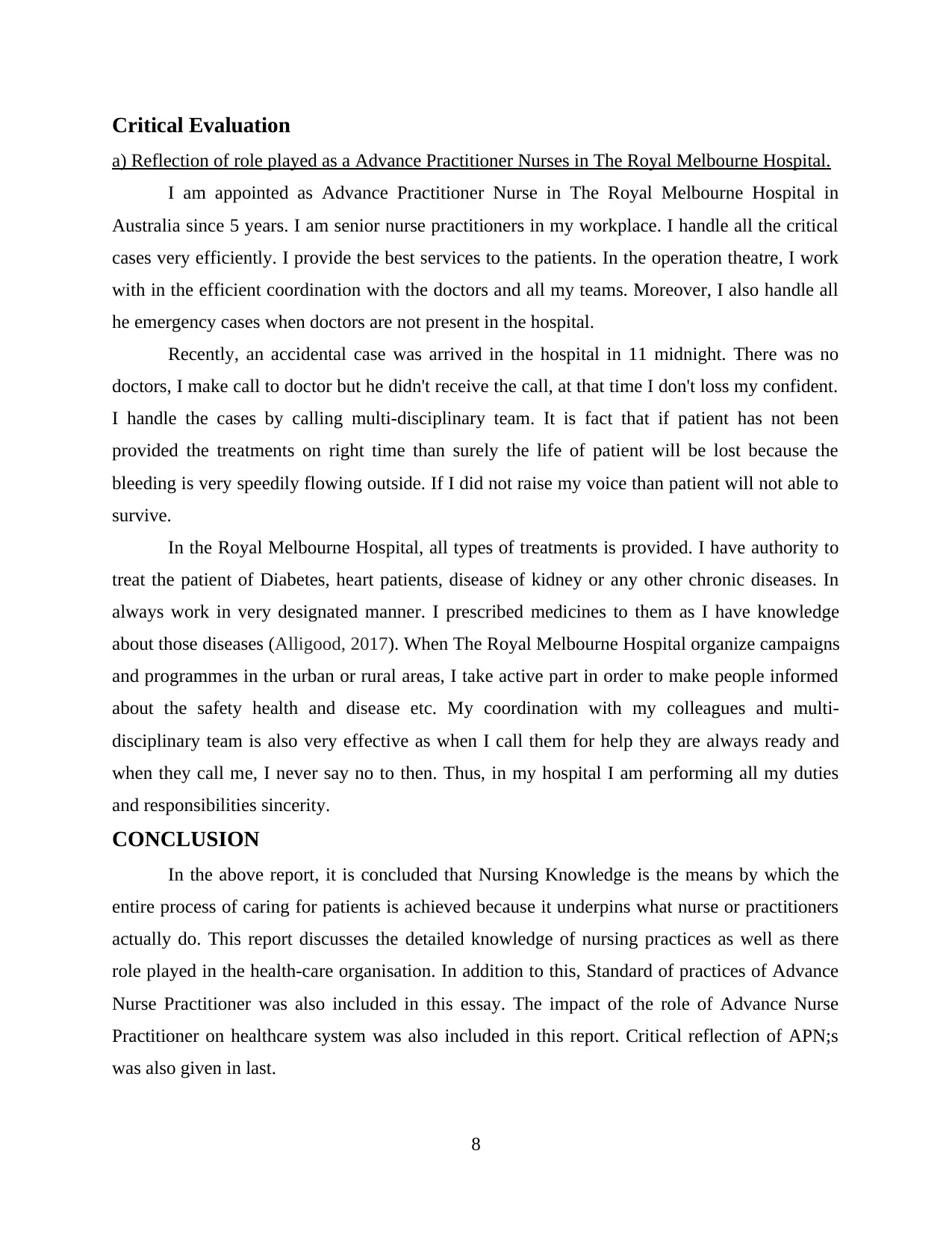
Critical Evaluation
a) Reflection of role played as a Advance Practitioner Nurses in The Royal Melbourne Hospital.
I am appointed as Advance Practitioner Nurse in The Royal Melbourne Hospital in
Australia since 5 years. I am senior nurse practitioners in my workplace. I handle all the critical
cases very efficiently. I provide the best services to the patients. In the operation theatre, I work
with in the efficient coordination with the doctors and all my teams. Moreover, I also handle all
he emergency cases when doctors are not present in the hospital.
Recently, an accidental case was arrived in the hospital in 11 midnight. There was no
doctors, I make call to doctor but he didn't receive the call, at that time I don't loss my confident.
I handle the cases by calling multi-disciplinary team. It is fact that if patient has not been
provided the treatments on right time than surely the life of patient will be lost because the
bleeding is very speedily flowing outside. If I did not raise my voice than patient will not able to
survive.
In the Royal Melbourne Hospital, all types of treatments is provided. I have authority to
treat the patient of Diabetes, heart patients, disease of kidney or any other chronic diseases. In
always work in very designated manner. I prescribed medicines to them as I have knowledge
about those diseases (Alligood, 2017). When The Royal Melbourne Hospital organize campaigns
and programmes in the urban or rural areas, I take active part in order to make people informed
about the safety health and disease etc. My coordination with my colleagues and multi-
disciplinary team is also very effective as when I call them for help they are always ready and
when they call me, I never say no to then. Thus, in my hospital I am performing all my duties
and responsibilities sincerity.
CONCLUSION
In the above report, it is concluded that Nursing Knowledge is the means by which the
entire process of caring for patients is achieved because it underpins what nurse or practitioners
actually do. This report discusses the detailed knowledge of nursing practices as well as there
role played in the health-care organisation. In addition to this, Standard of practices of Advance
Nurse Practitioner was also included in this essay. The impact of the role of Advance Nurse
Practitioner on healthcare system was also included in this report. Critical reflection of APN;s
was also given in last.
8
a) Reflection of role played as a Advance Practitioner Nurses in The Royal Melbourne Hospital.
I am appointed as Advance Practitioner Nurse in The Royal Melbourne Hospital in
Australia since 5 years. I am senior nurse practitioners in my workplace. I handle all the critical
cases very efficiently. I provide the best services to the patients. In the operation theatre, I work
with in the efficient coordination with the doctors and all my teams. Moreover, I also handle all
he emergency cases when doctors are not present in the hospital.
Recently, an accidental case was arrived in the hospital in 11 midnight. There was no
doctors, I make call to doctor but he didn't receive the call, at that time I don't loss my confident.
I handle the cases by calling multi-disciplinary team. It is fact that if patient has not been
provided the treatments on right time than surely the life of patient will be lost because the
bleeding is very speedily flowing outside. If I did not raise my voice than patient will not able to
survive.
In the Royal Melbourne Hospital, all types of treatments is provided. I have authority to
treat the patient of Diabetes, heart patients, disease of kidney or any other chronic diseases. In
always work in very designated manner. I prescribed medicines to them as I have knowledge
about those diseases (Alligood, 2017). When The Royal Melbourne Hospital organize campaigns
and programmes in the urban or rural areas, I take active part in order to make people informed
about the safety health and disease etc. My coordination with my colleagues and multi-
disciplinary team is also very effective as when I call them for help they are always ready and
when they call me, I never say no to then. Thus, in my hospital I am performing all my duties
and responsibilities sincerity.
CONCLUSION
In the above report, it is concluded that Nursing Knowledge is the means by which the
entire process of caring for patients is achieved because it underpins what nurse or practitioners
actually do. This report discusses the detailed knowledge of nursing practices as well as there
role played in the health-care organisation. In addition to this, Standard of practices of Advance
Nurse Practitioner was also included in this essay. The impact of the role of Advance Nurse
Practitioner on healthcare system was also included in this report. Critical reflection of APN;s
was also given in last.
8
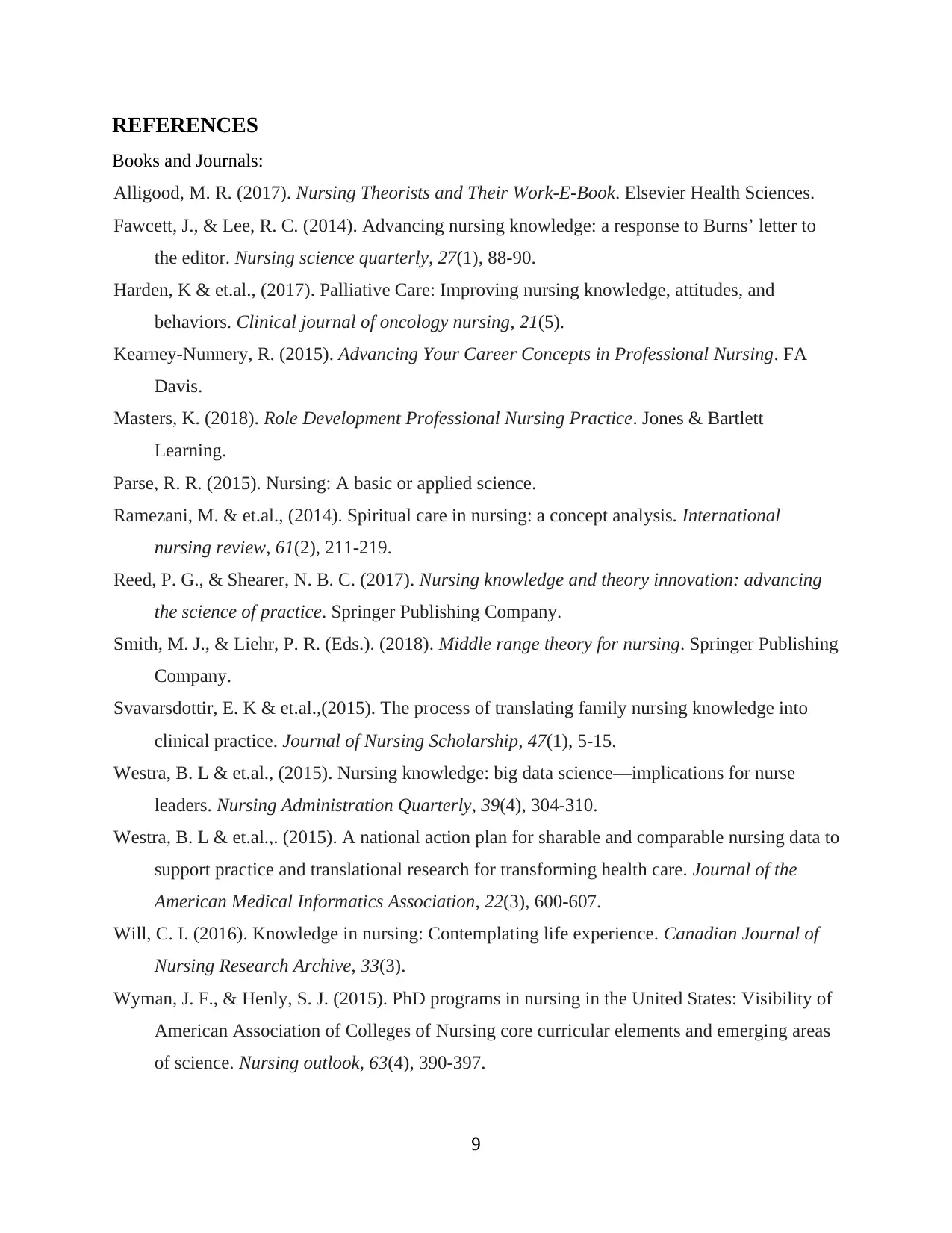
REFERENCES
Books and Journals:
Alligood, M. R. (2017). Nursing Theorists and Their Work-E-Book. Elsevier Health Sciences.
Fawcett, J., & Lee, R. C. (2014). Advancing nursing knowledge: a response to Burns’ letter to
the editor. Nursing science quarterly, 27(1), 88-90.
Harden, K & et.al., (2017). Palliative Care: Improving nursing knowledge, attitudes, and
behaviors. Clinical journal of oncology nursing, 21(5).
Kearney-Nunnery, R. (2015). Advancing Your Career Concepts in Professional Nursing. FA
Davis.
Masters, K. (2018). Role Development Professional Nursing Practice. Jones & Bartlett
Learning.
Parse, R. R. (2015). Nursing: A basic or applied science.
Ramezani, M. & et.al., (2014). Spiritual care in nursing: a concept analysis. International
nursing review, 61(2), 211-219.
Reed, P. G., & Shearer, N. B. C. (2017). Nursing knowledge and theory innovation: advancing
the science of practice. Springer Publishing Company.
Smith, M. J., & Liehr, P. R. (Eds.). (2018). Middle range theory for nursing. Springer Publishing
Company.
Svavarsdottir, E. K & et.al.,(2015). The process of translating family nursing knowledge into
clinical practice. Journal of Nursing Scholarship, 47(1), 5-15.
Westra, B. L & et.al., (2015). Nursing knowledge: big data science—implications for nurse
leaders. Nursing Administration Quarterly, 39(4), 304-310.
Westra, B. L & et.al.,. (2015). A national action plan for sharable and comparable nursing data to
support practice and translational research for transforming health care. Journal of the
American Medical Informatics Association, 22(3), 600-607.
Will, C. I. (2016). Knowledge in nursing: Contemplating life experience. Canadian Journal of
Nursing Research Archive, 33(3).
Wyman, J. F., & Henly, S. J. (2015). PhD programs in nursing in the United States: Visibility of
American Association of Colleges of Nursing core curricular elements and emerging areas
of science. Nursing outlook, 63(4), 390-397.
9
Books and Journals:
Alligood, M. R. (2017). Nursing Theorists and Their Work-E-Book. Elsevier Health Sciences.
Fawcett, J., & Lee, R. C. (2014). Advancing nursing knowledge: a response to Burns’ letter to
the editor. Nursing science quarterly, 27(1), 88-90.
Harden, K & et.al., (2017). Palliative Care: Improving nursing knowledge, attitudes, and
behaviors. Clinical journal of oncology nursing, 21(5).
Kearney-Nunnery, R. (2015). Advancing Your Career Concepts in Professional Nursing. FA
Davis.
Masters, K. (2018). Role Development Professional Nursing Practice. Jones & Bartlett
Learning.
Parse, R. R. (2015). Nursing: A basic or applied science.
Ramezani, M. & et.al., (2014). Spiritual care in nursing: a concept analysis. International
nursing review, 61(2), 211-219.
Reed, P. G., & Shearer, N. B. C. (2017). Nursing knowledge and theory innovation: advancing
the science of practice. Springer Publishing Company.
Smith, M. J., & Liehr, P. R. (Eds.). (2018). Middle range theory for nursing. Springer Publishing
Company.
Svavarsdottir, E. K & et.al.,(2015). The process of translating family nursing knowledge into
clinical practice. Journal of Nursing Scholarship, 47(1), 5-15.
Westra, B. L & et.al., (2015). Nursing knowledge: big data science—implications for nurse
leaders. Nursing Administration Quarterly, 39(4), 304-310.
Westra, B. L & et.al.,. (2015). A national action plan for sharable and comparable nursing data to
support practice and translational research for transforming health care. Journal of the
American Medical Informatics Association, 22(3), 600-607.
Will, C. I. (2016). Knowledge in nursing: Contemplating life experience. Canadian Journal of
Nursing Research Archive, 33(3).
Wyman, J. F., & Henly, S. J. (2015). PhD programs in nursing in the United States: Visibility of
American Association of Colleges of Nursing core curricular elements and emerging areas
of science. Nursing outlook, 63(4), 390-397.
9
⊘ This is a preview!⊘
Do you want full access?
Subscribe today to unlock all pages.

Trusted by 1+ million students worldwide
1 out of 9
Related Documents
Your All-in-One AI-Powered Toolkit for Academic Success.
+13062052269
info@desklib.com
Available 24*7 on WhatsApp / Email
![[object Object]](/_next/static/media/star-bottom.7253800d.svg)
Unlock your academic potential
Copyright © 2020–2026 A2Z Services. All Rights Reserved. Developed and managed by ZUCOL.




